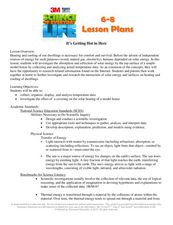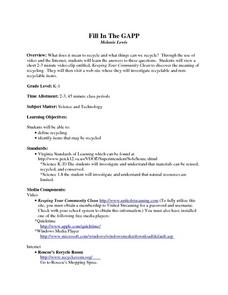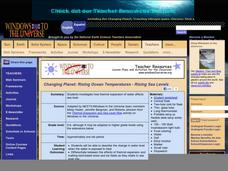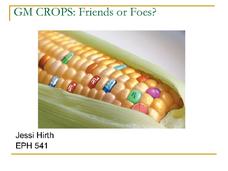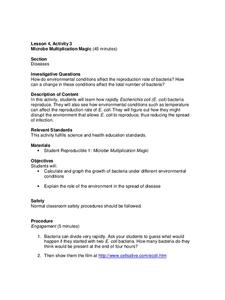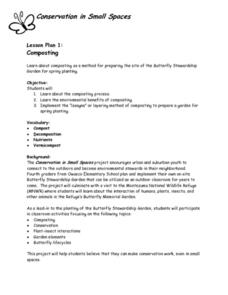Curated OER
Down in the Dumps
After an introduction to municipal sludge, middle school ecologists consider the pros and cons of dumping in the Hudson River Canyon. The class is split into two groups: one to debate in favor or dumping and one to debate against the...
Curated OER
Water Quality Survey: Monitoring the Sustainability of Pigeon Creek
High schoolers research the History of Pigeon Creek (or any watershed in your area). In this environmental science lesson, students conduct field tests such as pH and nitrates. They collect data and compare what they collected with other...
Curated OER
It's Getting Hot in Here
Discover the environmental and economic impact of global warming. After reading an article, emerging environmentalists identify how different countries are responding to the Kyoto Protocol. They research emission laws and write a news...
Captain Planet Foundation
Rotting Away
What happens at the end of a plant's life cycle? Show kids the natural way that plants show that they're decomposing, as well as the importance of compost, with a lesson about living organisms. After reading Log Cabin by Anne Schreiber,...
Curated OER
Fill In The GAPP
Youngsters discover what recycling is and identify things that can be recycled. They use both video and Internet resources to aid them in their study. This is a well-designed lesson with excellent activities and a nicely-written letter...
Curated OER
Effect of Technology on the Environment
There's no doubt that one of the most consistent dangers to our environment is the risks associated with the extraction and shipment of oil. This lesson focuses on oil spills - how they happen, the effects they have on the environment,...
National Library of Medicine
Your Environment, Your Health: Air Quality
Some scientists argue that air pollution now causes more deaths than smoking. The second unit in a six-part series focuses on air quality. Scholars learn what's in the air, how clean the air around their school is, and what they can do...
Captain Planet Foundation
George Washington Carver and the Sweet Potato
Learn about George Washington Carver's important contributions to agriculture by studying the sweet potato. First graders read about the inventor's observations and prepare sweet potato slips for the class garden. Additionally, they...
Curated OER
Changing Planet: Rising Ocean Temperatures - Rising Sea Levels
As an anticipatory set, young environmental technicians watch a video about how ocean temperatures seem to be changing along with the global climate. They perform a laboratory demonstration with the purpose of observing what happens to...
Curated OER
Changing Planet: Black Carbon - a Dusty Situation
Introduce your young meteorologists to black carbon produced by the burning of fossil fuels by showing the video, "Changing Planet: Black Carbon." Viewers discover that deposition of this carbon on polar ice impacts the absorption of...
Curated OER
A Walk in the Tundra
Discuss the environment of the Arctic tundra using this resource. The focus of this lesson is the story A Walk in the Tundra by Rebecca L. Johnson. The appealing illustrations are bound to captivate your class! After reading the story,...
Curated OER
The Extinction and Rediscovery of the Ivory-Billed Woodpecker
An incredibly thorough, and well-designed lesson teaches youngsters about the presumed extinction and rediscovery of the ivory-billed woodpecker in Arkansas. Learners discuss the environmental factors that led to the birds disappearance....
Cornell University
Shedding a "Little" Light on Cancer Surgery
Many types of cancer treatments now depend on nanotechnology—a big "little" discovery. Scholars begin by removing "malignant" tissue from simulated brains, one using fluorescent markers thanks to nanotechnology and one without. This...
Chicago Botanic Garden
Historical Climate Cycles
What better way to make predictions about future weather and climate patterns than with actual climate data from the past? Young climatologists analyze data from 400,000 to 10,000 years ago to determine if climate has changed over time....
Curated OER
GM Crops: Friends or Foes?
Genetically modified crops—How do you feel about them? Here, explore the benefits and risks of GM crops to inform your opinion.
Centers for Disease Control and Prevention
Microbe Multiplication Magic
A lesson introduces the reproduction rate of E. coli though a video. Then scholars complete a data table and graph of reproduction rates in ideal conditions as well as less than ideal conditions.
Curated OER
Conservation in Small Places - Composting
A fabulous instructional activity introduces the art of composting to your gardeners. In it, youngsters learn about the composting process and how it actually works. They discuss the environmental benefits of composting, and use the...
Curated OER
Hazards: Second Grade Lesson Plans and Activities
Equip learners with safety knowledge in the case of an earthquake. After coloring the places to go to get help after a quake, and label places that wouldn't be safe to go after a quake, young geologists simulate three levels of...
Columbus City Schools
Diversity of Living Things
Here's a topic classes can really dig—the fossil record. Use the well-organized and thoughtful road map to take eighth graders back in time to unearth the answer. Learn how our climate has changed, and how organisms have changed along...
Global Oneness Project
Deconstructing Consumerism
To increase awareness and launch a discussion of consumerism, class members view What Would It Look Like, a 25 minute film of images that capture the global effects of the consumption of goods. Viewers make a list of the images that they...
Curated OER
What Is Engineering Design
Students investigate the concepts related to the practice of designing and building large scale buildings. They conduct research using the internet and other resources in order to apply mathematics and architectural design principals in...
Curated OER
What is Wrong with My Pond?
Students examine various pond water samples to identify water quality. In this water quality lesson, students will identify levels of nitrates, ammonia, pH, hardness,and alkalinity in pond water. They will explain importance of water...
Curated OER
Science: What Is the Carbon Cycle?
Students examine the carbon cycle while identifying its sources, sinks, and release agents. Using magazines and newspapers, groups of students design collages illustrating the carbon cycle. Finally, they write responses to several...
Curated OER
What Is a Pond?
Pupils identify animals and plants that live in a pond. For this marine biology lesson, students create a chart of animals and plants they think they would see at the pond. Pupils create a "pond symphony" by imitating the sounds they...




